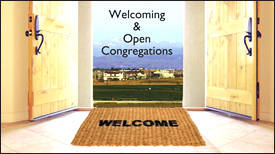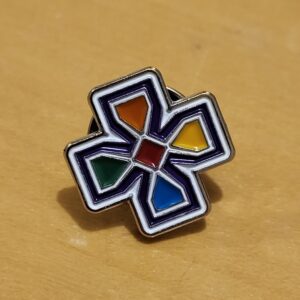Diarmaid MacCulloch, Professor of Church History at Oxford University spoke in Dublin on Friday 9th May about Faith and Sexuality. Professor MacCulloch’s ‘History of Christianity’ was made into a BBC TV series. He was ordained a deacon in the Church of England and is an openly gay man.
The event took the form of a conversation. Prof. MacCulloch was interviewed by Bryan Dobson, the RTE TV broadcaster.
The event was co-sponsored by CAI and the C of I chaplaincy at TCD.
Irish Times report, by Patsy McGarry, 12th May, 2014:
Bishops hear gay Oxford don lament his prohibition in ministry
Diarmaid MacCulloch, professor of the history of the Church at Oxford University: fell away from the church after being prevented from progressing beyond the post of deacon
Changing Attitude Ireland, a Church of Ireland group which promotes equality for LBGT people, has been invited to appear before the Church of Ireland Select Committee on Human Sexuality, as have a number of academics, General Synod was informed.
In its interim report the committee, set up in 2013, said it was likely to require more time than the two years agreed last year and would be seeking a further two years at General Synod in May 2015.
On Friday a public interview on ‘Faith and Sexuality’ with the openly gay academic Diarmaid MacCulloch, Professor of Church History at Oxford University, took place at St Audeon’s Church in Dublin. He also presented the 2009 BBC television series A History of Christianity: The First Three Thousand Years.
Discrimination Interviewed by RTÉ’s Bryan Dobson he spoke of his misery on being ordained a deacon in the Church of England and being prevented from progressing further due to his sexuality. For some time he fell away from the church, he said.
The event, organised by Changing Attitude Ireland and the chaplaincy at Trinity College, had an overflow attendance, including half of the Church of Ireland House of Bishops.
Standing room only in St Audoen’s as Diarmaid MacCulloch is interviewed
By Nigel Waugh
One of the most interesting General Synod discussions did not take place during the formal Synod proceedings. It was a fringe event held in St Audoen’s Church, close to Christ Church Cathedral, at which Professor Diarmaid MacCulloch was interviewed by RTE newsreader, Bryan Dobson.
The church was full to capacity, the attendance including several members of the House of Bishops and many clergy and lay people, both members of Synod and those who had come into town especially for the occasion.
Professor MacCulloch is Professor of the History of the Church at Oxford University and the author of several books. He is also widely known to the general public as presenter of the recent television series on Christianity.
Bryan Dobson expertly presented a number of questions which had been sent in advance and guided the speaker from his early life in a country rectory to his academic career and then to questions of theology. He also asked him about his gay sexuality and the part this had played in his life and career.
Professor MacCulloch said he had been aware of this at about the age of four, though naturally he would not have been able to put this awareness into words. He was 30 before he explained to his family that he was gay. After initial dismay, they had been very supportive, he said.
Diarmaid MacCulloch was accepted for ordination in the Church of England and was ordained deacon but when it came to being priested, the Church declined to ordain an openly gay man.
The discussion was wide-ranging and covered a number of topics.
As a historian, Professor MacCulloch sees Christianity as a young religion, having evolved in its theology, and the Church as sometimes having changed its understanding of itself.
An example of this, he said, is the Synod of Nicaea, when Arianism was in conflict with the Trinitarian position.
Asked about gay clergy and the Churches’ stance on gay marriage, Professor MacCulloch said that the Church had always had a number of gay clergy and that there had been a quiet acceptance of this until the 1970s when the gay liberation movement shone a spotlight upon the subject.
He said there had been no Church weddings until the 11th century, the Church having “hijacked” marriage and then composing a theology of it, adding that Jews had practised polygamy until the 11th century and that Jesus had gone against the tradition of the time in advocating monogamy.
When asked about the ‘proof passages’ in Leviticus and Romans, Professor MacCulloch said that Jesus had been entirely silent about homosexuality, but had clearly said that divorce was not permitted. However, the Professor said that the Church had chosen to ignore that injunction in the present day.
In the Romans passage, Paul was writing on idolatry, about worshipping wrong things, and his reference to sexuality had not been his main subject, Professor MacCulloch said, adding that Paul’s condemnation had been made in one church at one particular time and was not necessarily meant for all time.
As an example of quoting support from Scripture, he mentioned the American Civil War, pointing out that in the United States the Confederates had had Scripture on their side in support of the practice of keeping slaves, as slave owning could be justified from Scripture.
Using Scripture to endorse the murder of gay people in Uganda, Nigeria and Kenya, as some Anglican bishops have done, is wicked, the Professor added.
Asked about ‘messy church’ and free forms of worship, Professor MacCulloch said these were very ‘me’ centred. Historic liturgy is objective, and emphasises the communal aspect of worship, not just what ‘I’ feel but what ‘we’ have felt, he added.
He said that although cathedrals have a very formal liturgy, particularly Choral Evensong, and although people do not “rush up and make you welcome”, cathedrals in England have experienced a 30% increase in attendance in the last 10 years.
Asked about the establishment of the Church of England, he said this was “a happy accident”, although he did not think that having bishops in the House of Lords was a good idea, saying that the practice “parallels with the situation in Iran”.
Professor MacCulloch brought a wealth of knowledge and erudition to a wide variety of questions. The discussion could have continued for some time but proceedings were drawn to a close in time for the audience to return to the afternoon session of General Synod.
I was left feeling that, despite his being a ‘candid friend of Christianity’, the Church has missed out on the services of a clever, wise and extremely able advocate by refusing him ordination.
The Revd Darren McCallig, chaplain to Trinity College, and Changing Attitude Ireland, who co-sponsored the day, deserve our thanks.
The Revd Nigel Waugh is editor of The Church Review, the diocesan magazine of Dublin and Glendalough.


